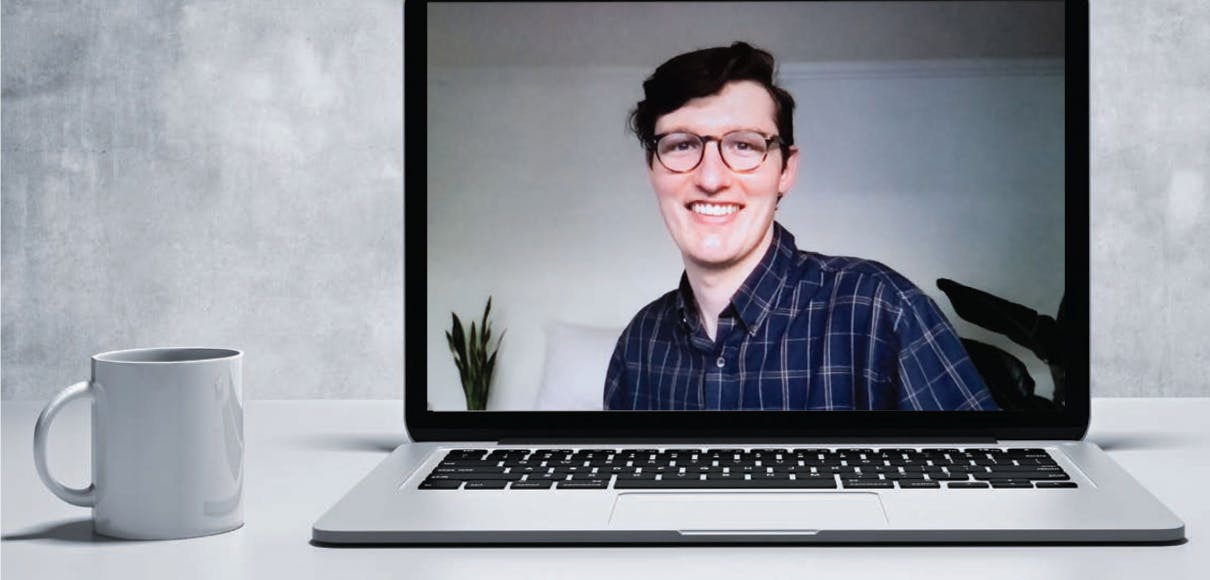TYLER BREIER ’17 always knew he wanted to work in a helping profession. He thought of becoming a vet or a surgeon, but the idea of nursing didn’t initially occur to him.
“I had an internalized bias,” Breier said, “because on TV, nurses were almost always women. I didn’t realize I could become a nurse myself.”
When he began looking more closely at health care jobs, he realized nurses had more direct interactions with patients.
“I’m an empathetic person,” he said, “and I love connecting with people. I wanted to develop relationships with my patients.”
That desire led him to care for cancer patients during his early clinical experience. As a nurse technician — a nursing student gaining practical skills — he worked with bone marrow transplant patients at the Seattle Cancer Care Alliance at the University of Washington’s Medical Center in Montlake. After graduating from the Seattle Pacific University nursing program, he was hired full time.
“I loved oncology because I could take care of the same patients over the course of several weeks and get to know them. We had more time with patients than nurses do in other fields. When patients were experiencing side effects of chemotherapy, we had time to stay and give them comfort. We were present with families when their loved ones were nearing death, and we tried to make the experience as gentle and loving as we could. We had time to sit and cry with our patients — yes, if you cry around me, I’ll cry with you.”
On the unit, there were triumphant moments, too, such as when the staff gathered around the nurses’ station and rang a bell as someone was discharged and going home.
For his senior year nursing practicum, Breier worked at Seattle’s Roosevelt High School, where he shadowed the school nurse, helped provide education to health classes, connected students with counselors, and assisted students whose parents didn’t speak English find medical providers.
The work experience, along with SPU’s holistic approach in its curriculum, was something Breier appreciated in the nursing program. “While many nursing schools focus primarily on the clinical and assessment skills needed to treat patients, SPU’s program also emphasized a patient’s whole being: physical, mental, and spiritual. We also learned not to overlook historical factors — what resources were available to patients growing up, where they lived, and their trauma history. The one clinical moment we’re experiencing with a patient is not detached from the history of that individual.”
Recently, Breier accepted a job as a public health nurse with King County’s Child Care Health Program. Breier can’t yet visit the child care centers in person because of the pandemic. Instead, he conducts virtual visits with child care staff and directors.
“It’s a complicated task for child care workers these days. Every week there’s a new COVID-19 protocol. Now we not only answer questions about childhood development, nutrition, injuries, storing medications, and safe classroom setup, we discuss complicated COVID-19 guidelines. These workers are on the front lines providing quality care, but they can’t know the particulars of every new guideline. That’s what the public health staff is here for,” Breier explained.
The position allows him to look at nursing from a global standpoint, examining the root causes of illness in specific populations, inequities in the health care system, and what the medical field refers to as “upstream barriers of health.”
“The one clinical moment we’re experiencing with a patient is not detached from the history of that individual.” — TYLER BREIER
Breier is now pursuing a doctor of nursing practice degree at the University of Washington, where he’s examining how social determinants affect public health.
“I began thinking about how racism, sexism, heterosexism, xenophobia — all the ‘isms’ of the world — contribute to ill health. I want to work on health care policy beyond one hospital or clinic, to create programs that increase health equity for communities that have historically been marginalized and underserved.”
The pandemic has exposed many of those inequities. “According to King County Public Health statistics, communities of color are impacted the most by COVID-19. Part of the problem is that these communities experience the toxic effects of racism,” Breier said.
“American cities historically segregated communities of color into specific geographical areas by redlining, a discriminatory practice that allowed banks to refuse home loans or mortgages to Black families and people of color in white neighborhoods. Because public health resources and health insurance are more accessible in wealthier white neighborhoods, Black communities with lower incomes are systemically denied access to adequate public health resources.”
“Racism is a public health crisis,” Breier said. “Systemic, interpersonal, and internalized racism creates stress and trauma in individuals. This can elevate the stress hormone cortisol, for example. If elevated for extended periods of time, that can lead to chronic illnesses such as cardiovascular diseases, diabetes, and cancer.”
The beauty of nursing, Breier said, is its diversity of roles. “You can work directly with patients in clinics or acute care settings, you can focus on community health care and the prevention of illness, or you can lead research with an advanced degree. Or a combination of these.”
Breier has set his sights even higher, hoping to one day run for Congress. “We need health care workers in positions of policymaking. In nursing school, we learn how to advocate for individual patients, but not how to write health care policy. Nurses are the largest college-educated workforce in the country, but only a handful of nurses hold seats in Congress. We need to be representing our patients in a way that impacts how health care looks in this country.”




